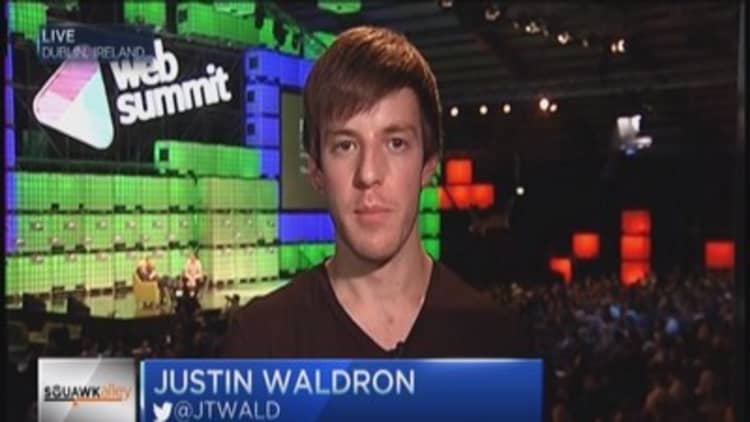In the Xbox universe, there's "Halo" —and there's everything else. The venerable franchise has sold more than 60 million copies to date and shows no signs of slowing down.
While the Master Chief and his crew cast a big shadow, Microsoft has actually put together a strong catalog of other go-to franchises along the way, including "Gears of War" and "Fable". In late October, it published its latest effort to build another franchise: "Sunset Overdrive".
The game, which was developed by "Ratchet and Clank" creators Insomniac Games is what's called a "first party" title in the industry: something published by the console maker and is exclusive to their game system (in this case, the Xbox One).
And first party games are a critical part of any console's success. Microsoft has "Halo;" Sony has "Uncharted," and Nintendo has "Super Mario(and more)."
Read MoreActivision gets out big guns for Call of Duty: Advanced Warfare
Historically, Microsoft hasn't talked much about how it picks games to publish under its label. However, the software giant's game gurus sat down with CNBC to go through the process.
Rule one: Rookie developers don't stand much of a chance.
"Most of these projects begin not as somebody coming up for the first time and us looking at a proposal or video," says Matt Booty, general manager of Microsoft Studios. "They are the culmination of a longer relationship—and really knowing a developer well enough to be able to talk about what their passion is and what they want to make, so that we can get behind them."
That's not to say that game makers who don't already have a hit to their name are shut out. Ken Lobb, creative director at Microsoft Studios, says the company also likes to look at the potential levels of smaller studios.
Read More Judge dismisses Manuel Noriega's 'Call of Duty' lawsuit
"It's easy to look at a game like 'Sunset Overdrive' and say you're looking to sign AAA studios to make AAA games," he says. "And that's true. But I see lots of pitches and I play lots of games. I like to find a developer that feels like they haven't been put in the right situation to make a AAA game."
This sort of thinking led the company to partner with the relatively unknown Moon Studios to create "Ori and the Blind Forest," due later this year.

Rule two: Realistic ambition and unbridled passion turn heads
The single most important thing, Booty and Lobb agree, is that a developer must have an unbridled enthusiasm for the game they want to make—and have the skills to back that up.
"I want to be able to look across a table at a creative leader and see that the idea they're talking about is what they really want to make," Lobb told CNBC.
"Of course, there are lots of technical questions, but first and foremost, it's creative visionaries who have this passion and want to build something," he added. "Then the next question is: Is this group capable of building this vision?"
Read More Wal-Mart beefs up its used game business
Rule three: Play well with others
The process of creating a major game is a time consuming process that can take more than a year, and eveloper desires and publisher demands don't always sync well. Microsoft assembles a team of producers and other back end personnel with a lot of collective video game industry experience. It's key that both parties are able to communicate effectively and work through differences amicably.
"It really is very much relationship-based," says Booty. "For us, publishing is about relationship development. If you form that, you get trust - and a shared excitement. ... Someone once told me that a video game gets made by the 50 decisions that get made every day and those decisions add up over two years."
Rule four: An undying love for older games can pay off
While big hits pay the bills at Microsoft's entertainment division, beloved games that fall flat aren't always left behind. Sometimes, against all odds, a flop can take on cult status. That, in turn, can prompt Microsoft to try again.
if a developer has never stopped loving (or playing) the original, that can be a big bonus. When Microsoft decided to reboot the "Killer Instinct" arcade game on Xbox One, it reversed its usual policy of having its business development team bring development teams in.
Instead, Lobb gave that group marching orders to reach out to a small pool of developers, out of which Microsoft teamed with two to make the game. It did the same thing recently when it decided to revive "Phantom Dust," a critically loved, but commercial failure, from the original Xbox.
Read More 'Halo' creators' 'Destiny' tops sales expectations
Rule five: Don't be a copycat
Too many developers think that the hunt for the next "Halo" means they have to approach the company with a game (or genre) that follows in the exact same footprints of the megahit.
That's not true, says Booty. Instead, Microsoft looks for something that will showcase what's unique about the Xbox platform.
"Clearly there is a portfolio level of thinking that goes on," adds Lobb. "We don't need more games in the same family as 'Halo' or 'Gears of War,' so we'd be less likely to pick up a first person shooter because that portfolio is full."

